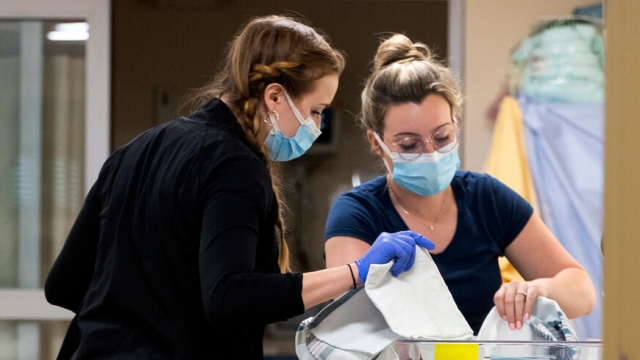It’s National Nurses Day—the start of National Nurses’ Week—a time to thank nurses for what they do every day. But more and more nurses are leaving the industry due to poor working conditions.
We all know just how critical a role nurses play in the health care system; we specifically saw that during the COVID-19 pandemic. But many nurses say they’re not happy and are thinking about leaving the job.
They’re the backbone of the health care industry, yet a new survey says many registered nurses (RNs) are thinking of quitting.
Nearly a third of nurses surveyed say they’re thinking about leaving the profession, citing stress.
"There’s a shortage. There’s a shortage everywhere with nurses," said Amanda Anderson, director of nursing at Saint Joseph Hospital.
The solution? They say it is higher pay, safer work environments, and fewer patients per nurse.
"We need nurses now more than ever. Our population is growing; we have folks that are retiring, registered nurses that are retiring," said Melissa Burdi, Vice President and Dean at Purdue Global School of Nursing.
New data from Scholaroo, a non-profit educational research company, analyzed the current working conditions and how many nurses there are in each state.
46% say they’re planning to change careers because of the negative effect the job has had on their health, including working long hours due to the lack of staff.
SEE MORE: More psychiatric nurses are needed to fill mental health care gaps
It ranks the top 10 states with the highest "nursing shortage in the U.S.", putting Utah at number 1.
But when it comes to the nursing shortage, National Nurses United, the largest union of registered nurses in the U.S., says there isn’t one.
"The hospital industry, their employers have engineered it," said Jean Ross, president of National Nurses United.
Rather, it’s a staffing crisis. She says hospitals have been adding more ancillary staff—other licensed or certified personnel that help nurses—to protect their bottom line.
"But that doesn't mean that if you have more of them, you can cut down on the number of registered nurses. It doesn't work that way," said Ross.
It’s been happening even before the COVID-19 pandemic.
"It's a constant struggle to get them to not try to replace us with non-registered nurse personnel, but it isn't going to help the situation that we're in now when there are enough registered nurses in this country. But they're refusing to hire them because it affects their bottom line," said Ross.
Data from the National Council of State Boards of Nursing shows there are close to a million nurses with active RN licenses who are not working as nurses in the U.S.
Ross says poor working conditions are driving nurses away, affecting the quality of care for patients.
"Our goal is not to just keep people from dying; it's to have them well, to leave better than when they came in," said Ross.
To push for better working conditions National Nurses United is lobbying in support of five bills on Capitol Hill during National Nurses’ Week, including one that addresses nurse staffing standards.
The bill, S. 1567, would establish minimum registered nurse-to-patient staffing ratio requirements in hospitals.
One of the bill’s sponsors says the bill would result in higher-quality care for patients. There’s also another bill, S. 4182, that addresses workplace violence prevention.
Trending stories at Scrippsnews.com




